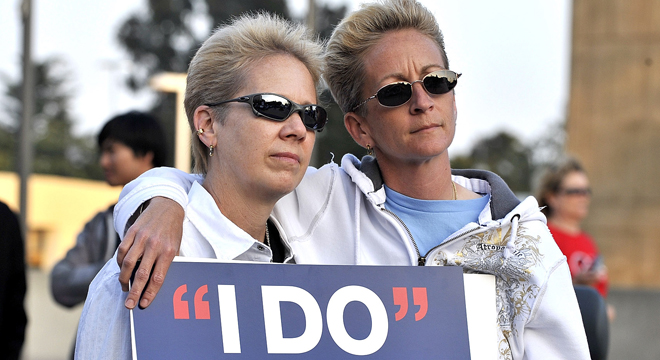As you’ve likely seen, Bill Clinton authored a oped piece in The Washington Post today arguing that the Defense of Marriage Act, which he signed into law in 1996, should be overturned by the Supreme Court. Many people think this today. And over the last year it’s become something like an orthodoxy on the Democratic side of the aisle. But was he right to sign it in the first place?
I say that as an intentionally provocative question. It seems obvious now that he shouldn’t have. And it also seemed obvious to a lot of people at the time that he shouldn’t have signed it.
It’s true that the politics of gay marriage has changed drastically over the last 17 years. But this is a case where we shouldn’t overstate how much it’s changed. Very few Democrats wanted Bill Clinton to sign the bill into law at the time. And I mean that in the sense of thought this was an important thing to do and a law we should have.
Remember, the year 1996 isn’t accidental. The Defense of Marriage Act was designed as an election year poison pill. There were no states that allowed any form of gay marriage at the time. The whole concept had very low support nationwide. But Republicans knew that by putting the law on Clinton’s desk they’d put him in a very uncomfortable position — sign it and seriously demoralize a part of his base or veto it and stake out a position that at the time had very little public support and possibly cost him the election.
As Richard Socarides notes here in The New Yorker, he got trapped …
The simple answer is that he got boxed in by his political opponents, and that his campaign positions on gay rights ran ahead of public opinion. But there was another important factor: a failure to imagine how quickly gay rights would evolve, and how difficult it would be to undo the damage that DOMA did.
(By the way, if you’re not reading Richard’s on-going reports and commentary on this and other issue, you’re really missing something. For additional perspective, DOMA passed 85/14 in the Senate and 342/67 in the House.)
Let me have my own moment of candor here. At the time, I thought it was definitely the right thing to do to sign it. Or rather, I thought the best course was to sign the bill. Losing the 1996 election and putting Republicans in unified control of the federal government seemed like a very, very big and real threat. On the other hand, signing the bill meant preventing states that didn’t have gay marriage from being forced to accept gay marriage by states that did — and this when no states allowed it at all. In other words, it was, at the time the law was addressing it, a totally hypothetical issue.
I don’t say this with any pride. Even if it were a notional harm it still stigmatized the LGBT community as second class in federal law, just as DADT did. And I have no doubt it should be overturned today. Because today it is causing concrete harm to particular people. But I put this forward because I find myself in a morally similar position to Clinton himself.
Needless to say, you could find many historical parallels in the country’s evolution on racial equality or women’s rights or a number of other issues. And today, it seems obvious. But I raise the question because it goes to a perennial question about political pragmatism. If you the decision back in 1996 was yours to make — not where we are today but where the country was in 1996 — what would you do?
Late Update: TPM Reader MN makes a point I’d forgotten and hadn’t remembered in those vote totals that should have reminded me. If he’d vetoed DOMA, Congress had the votes to override the veto by a big margin.






